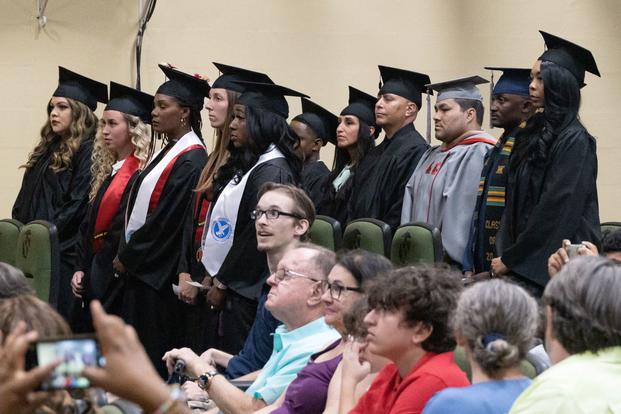A federal court has overturned an earlier decision that would have allowed veterans to receive up to an additional year of education benefits under the Montgomery and Post-9/11 GI bills, a judgment that will be appealed to the U.S. Supreme Court, the plaintiff's attorneys say.
Last month, the U.S. Court of Appeals for the Federal Circuit reversed a 2021 ruling by a three-person Federal Circuit panel that would have let Army veteran James Rudisill receive the maximum amount of education benefits stipulated in the GI bills.
Attorneys argued that Rudisill, who served as an enlisted soldier in the Army from 2000 to 2002 and as an officer from 2007 to 2011, was entitled to the maximum allowed by law from the Department of Veterans Affairs, up to 48 months from both programs.
Read Next: Here's How to Use Your GI Bill
The VA's attorneys have asserted that the law creating the Post-9/11 GI Bill limits entitlement to one program or the other, based on what the veteran selects.
A three-judge panel sided with Rudisill in July 2021, but the federal government petitioned for the case to be heard by the full court. In its decision, handed down Dec. 15, the court ruled that the law states that if a person has some used benefits under the Montgomery GI Bill program and elects to receive benefits under the Post-9/11 program, the benefits will be limited to one month, or a partial month, of entitlement under the Post-9/11 GI Bill for each month of unused benefits under the Montgomery GI Bill.
The statute is "unambiguous," the judges wrote.
But Rudisill's attorneys say the decision "upends traditional understandings of veterans' educational benefits being earned for specific qualifying service." Since Rudisill had different periods for which he qualified for different benefits, he should be able to use them both to the maximum allowable amount, they said.
"[The decision] really turns the whole thing on its head," said Timothy McHugh, an attorney for law firm Troutman Pepper who has taken the case pro bono. "It turns how GI Bill programs as a whole have worked over the years on its head by disregarding qualifying service and saying no, the thing that matters is whether you are entitled to one benefit or the other."
The Post-9/11 Veterans Educational Assistance Act of 2008 greatly expanded education benefits for veterans and their families over the Montgomery GI Bill, increasing coverage for tuition and fees, housing, books and more, and also allowed for transferability to dependents.
In 2021, 73% of veterans served by the VA for educational benefits used the Post-9/11 GI Bill, at a cost of $9.1 billion. About 58,000 veterans used either the active-duty or Selected Reserve version of the Montgomery GI Bill, totaling $268 million.
Rudisill used 25 of his 36 months of eligibility under the Montgomery GI Bill early in his career to earn his undergraduate degree so he could return to the Army as an officer. He did not use any of his Post-9/11 GI Bill after earning his commission.
After Rudisill left the Army, he decided to return to the service as a chaplain and applied to use his Post-9/11 GI Bill to attend Yale Divinity School. He believed that he was entitled to 23 months of additional benefits, to max out at 48 months. The VA said he was entitled to nine additional months, for a maximum of 36.
According to data provided to Rudisill's attorneys under the Freedom of Information Act, 2,099,627 veterans received Post-9/11 GI Bill benefits and gave up some other form of educational benefit in the process.
Another 650,000 were limited to accessing their Post-9/11 benefits until after they exhausted their Montgomery GI Bill benefits.
McHugh said his team will file a writ of certiorari in February petitioning the U.S. Supreme Court on behalf of his client and all affected veterans.
"This was meant to be something designed specifically in recognition of wartime service and, specifically, arduous service," McHugh said. "It was meant to be an expansion or an additional benefit on top of the Montgomery GI Bill and not something that was either/or."
-- Patricia Kime can be reached at Patricia.Kime@Military.com. Follow her on Twitter at @patriciakime.
Related: Thousands of Veterans May See Disability Deadline Waived as Supreme Court Takes Up Case
Keep Up With Your Education Benefits
Whether you need a guide on how to use your GI Bill, want to take advantage of tuition assistance and scholarships, or get the lowdown on education benefits available for your family, Military.com can help. Subscribe to Military.com to have education tips and benefits updates delivered directly to your inbox.














